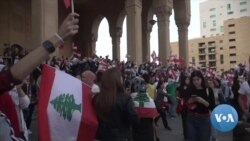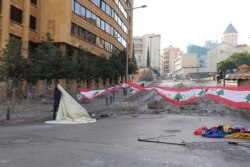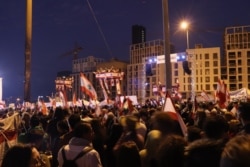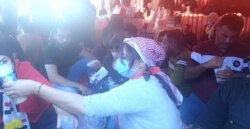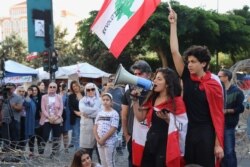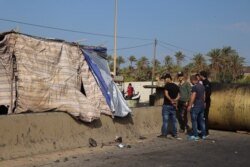BEIRUT — What is driving people all over the world into the streets to protest?
In the Middle East, protesters say it started with desperation and anger, and now there is no going back.
Ali Shamari was 29 years old when his home in Fallujah, Iraq, was bombed in a battle with Islamic State militants.The roof collapsed and his wife, mother, father, brother, sister, son and two small daughters were all inside. Shamari was the only survivor.
Five years later, he is living in a tent in Tahrir Square in Baghdad, protesting full-time against a government he says is so neglectful and corrupt that children are dying.
"I have nothing left to lose so I will never leave this protest," he said. "We need security, health care, education, justice and jobs. If they kill us here, we will die, so the next generation can maybe have these basic rights."
Hundreds of people have been killed in the Iraq protests that started last month, and thousands more have been injured as clashes continue to break out between protesters and security forces. Fewer than two weeks ago, militiamen in Fallujah set fire to his rebuilt house in retaliation for his presence at the protests, according to Shamari.
In Lebanon, mass protests have mostly remained peaceful for the past month and a half, but sectarian riots erupted early Monday, after sporadic clashes and the death of one activist.
Algerians have demonstrated every week since February and scores of people have been arrested in a movement some call the Revolution of Smiles.
All three ongoing long-term demonstrations have no specific leaders or clear vision of what a victory would look like. They are not trying to oust individual dictators, but entire political systems to address massive injustices that include corruption, unemployment and wretched government services.
The Middle East is rich, they say, but the people are poor. And across the region, rallies continue as governments promise reforms but either cannot or will not take concrete action.
"Our country is full of oil," said Najlaa al-Jubory, a 42-year-old mother of two who has been protesting in Baghdad nearly every day for more than a month. "And the government doesn't give us a drop of help."
Lebanon Day 40
Unlike Iraq, Lebanon does not export oil, but protesters say the political elite still manages to consume most of the country's wealth, leaving average people without access to jobs, health care and basic government functions, like steady electricity and trash collection.
Outside of Tripoli, Lebanon's second city, young men block a road with giant sewage pipes and the remnants of burned tires. A nearby sweets factory has been shuttered for years, they said, because politicians lobbied to close it, leaving thousands of people unemployed.
"They did it because they want to keep us poor," said Nader, 26. "Then they can buy people's votes in elections for a cheap price."
Since the upheaval began in Lebanon, the economy has declined and government has stagnated. Businesses are failing and wages are plummeting.
But on Friday, demonstrators held massive festivals and multiple marches in the name of revolution.
Acrobats hung over Beirut's Martyrs' Square while thousands of people waved flags, shouted, sang and danced. Young protesters tossed trash into the grating covering the door of the shuttered bank regulator. Hundreds of people banged on walls and pots and pans, creating a cacophony that could be heard more than a half kilometer away over the sounds of a nearby concert.
By Sunday, the mood was less hopeful. It was the 40th day of demonstrations that have not led to significant change. Protesters in Beirut set up a roadblock to pressure authorities, and riots broke out early Monday between them and Hezbollah supporters.
Hezbollah is one of Lebanon's most powerful political parties and its strongest military.
At the demonstrations, protesters regularly shout, "All of them means all of them!," a call for the entire political class to step down. When asked if that includes Hezbollah leaders, some protesters asked that cameras be turned off and notebooks closed.
"If things stay tense you might have violence between people," said Alain Aoun, a parliament member. Clashes between security forces and protesters are unlikely in Lebanon, he added, but sectarian divisions are deep and complex, and memories of the country's 15-year civil war are still fresh.
"It's very dangerous," Aoun said.
Iraq stalemate
"At the beginning I was at a protest with female engineering students," said al-Jubory, the mother in Baghdad. "But they turned water cannon on the girls and knocked them down."
And the violence that began in early October has only intensified as protests grow louder and bolder in response to the deaths of activists, she added. What was originally a call for reform has become a high-pitched scream for the resignations of key politicians.
Prime Minister Adil Abdul Mahdi has said he will step down when a replacement is found, but so far promises of reform have not materialized.
"The problem at the moment is that the politicians are insistent that this system cannot be fixed," explained Ayad al-Anbar, a political science lecturer at the University of Kufa in Iraq. "And even when they do make promises, the people in the streets don't believe the elite is just going to hand them their rights."
Like in Lebanon, the government is having difficulty doing anything at all while the country is in turmoil. But the turmoil will not abate until the government does something, al-Anbar said.
On the streets, protesters say at this point they feel like they have no choice but to continue to demonstrate. People have died for this cause, said Shamari, the man who lost his family, and the sacrifice must be honored.
"No one will go home," he said. "There is no point. Either we will get what we deserve or we will die."
Algeria elections
In Algeria, the protests are a weekly affair that has gone on since February, mostly without violence.
And in some ways, they have been successful, with President Abdelaziz Bouteflika stepping down in April, instead of running for another term in office as he had planned. New elections are scheduled for Dec. 12.
But even though protesters won, they did not really win, and rallies have only intensified, according to John P. Entelis, a political science professor at Fordham University. He has written extensively on North Africa.
The candidates for the coming election were part of the old regime, he said, and not viewed as legitimate reformers. Like Iraq and Lebanon, Algerian protesters are calling for the dismantling of the entire political system and want elections that are not organized by the current leadership.
At protests last week, crowds chanted, "We are not interested in your vote!"
"The government will not fundamentally alter," said Entelis."The political system is just rotten to the core."
Algeria's government tolerates protests to a point, he added, but if the peaceful weekly events morph into something more raucous, they may quickly disintegrate into violence.
"It's almost like political theater," he said. "If it goes beyond the script, the military will come down pretty hard."
Equality on the streets
At the moment though, protesting in Algeria is still an act of hope, Entelis said.
In Tahrir Square in Baghdad, young men and women discuss how to overcome sectarian divisions and rid the country of competing foreign influences.
"In the past I was hopeless [about] the sectarianism in this country. Politicians play with us in the name of religion," said al-Jubory, the mother. "Now if you sit in the tents and listen to the conversations people are having, you can tell they are thinking and understanding."
In Martyr's Square in Beirut, young people discuss the world they believe they are building, and how different they want it to be from the world in which they were brought up. The Lebanese government is an inherently sectarian system that was set up to allow the religious groups to live together after the civil war ended in 1990.
The result has been continued divisions at the expense of the people, said Ayman Debiane, 22. Behind closed doors, he said, politicians are fine with each other sharing the spoils of the nation.
"Then they come on TV," he added, "and they blame each other."
And while the protests around the world are not literally connected, they feed each other and sustain themselves through social media, said Nadeem, 36, an entrepreneur who makes patriotic hats and notebooks, one of the few businesses growing with the protest movements. Information is now shared so fast, he said, governments cannot hide behind state media or politically affiliated news channels.
"You can no longer hide the truth," he said.
Leaderless protests
Without leaders, the protests keep growing, as any grievance that compels a person to the street will do, said Debiane, calling the uprising "a beautiful chaos."
But without leaders, added Entelis, the political scientist, protest movements can fail to enact the changes they are demanding.
"It is a disadvantage in the long run because it is hard to coordinate a nationwide movement that can challenge the state," he said.
And in recent history, most large-scale demonstrations have not led to the democratic transformation protesters desire, Entelis said.
After the Arab Spring protests in 2011, Egypt eventually slid back into another military dictatorship, Syria was consumed by war and Libya was split in half, at war with itself. Only Tunisia, which is now poorer than it was before 2011, seems to be continuing a democratic transformation.
But on the streets of Iraq, Lebanon and Algeria, crowds continue to gather, saying they won't stop until their governments are replaced and their demands are met.
"It is worldwide," said Mohamad Ali, 28, at a protest in Beirut. "They want this change and they will not back off until they have this change."
Halan Akoy contributed to this story in Iraq.




